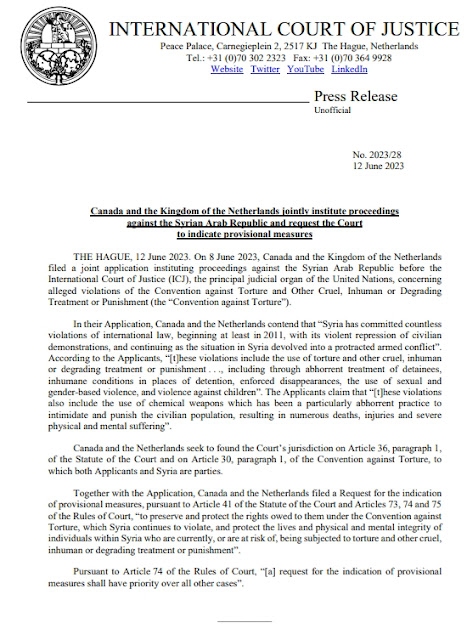Netherlands and Canada's ICJ Torture Case Against Syria: A New Era of International Indictment of Sovereign Governments' National Crimes
Netherlands' torture and other ill-treatment case against Syria at the International Court of Justice opens a new chapter in the international order and practice. Although our previous experience with the international order and the international institutions, especially in the Syrian crisis, lets almost no room for any expectations for this case to end torture in Syria or to achieve any difference in the course of action of the Syrian regime, it definitely can lay the foundation for this end by the international documentation, indictment and recognition of these domestic crimes.
In general, this unprecedented ICJ case has a particular international importance as It has a real chance to prompt a beginning of some international system development in terms of the international responsibility and role concerning ill-governance, which is generally fenced by the norm of sovereignty, especially in terms of systematic practice of torture and other kindes of ill-treatment by national governments.
This importance belongs to three factors:
1- It is an international precedent and this precedence per se will open and lead the way for new international practices and realities in this regard.
2- It will officially and judicially document and recognize domestic crimes at the international level. This will have implications at the domestic and international levels to be decided by the consequent actions by the domestic and international actors including other states and international organizations.
3- At the Syrian level, this case and its proceedings will constitute a significant moral blow to the recent normalization efforts with the Syrian regime and the states leading this normalization process. It will actually affect the development and the outcomes of the normalization efforts and will cause by default an embarrassment to the governments leading these efforts internally and internationally.
Moreover, it sheds light on availability of international means --regardless of their efficacy-- should states opt for supporting good governance and basic human rights along with the reluctance of states to make recourse to these means. These two facts are demonstrated by this dutch unprecedented resolution and the vast abstaining from joining Netherlands and Canada in this case by other states.
Although the 3-month postponement of the provisional measures indication hearings at the request of the Syrian government (regime) makes a really bad start for this unprecedented process, this case, its proceedings and its outcomes and consequences should be attentively monitored and considered by all parties including domestic and international actors and get contemplated by studying researchers and scholars.



